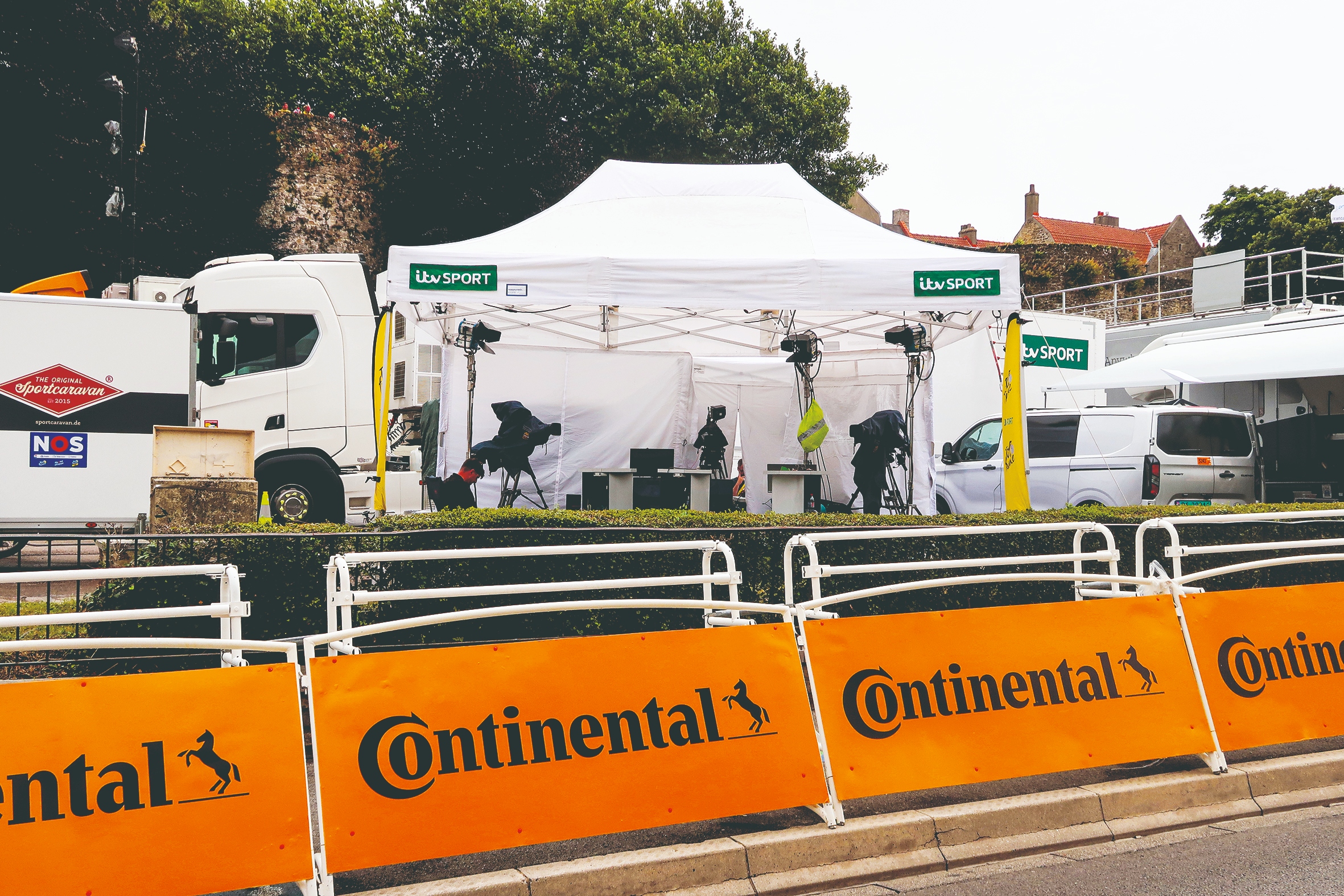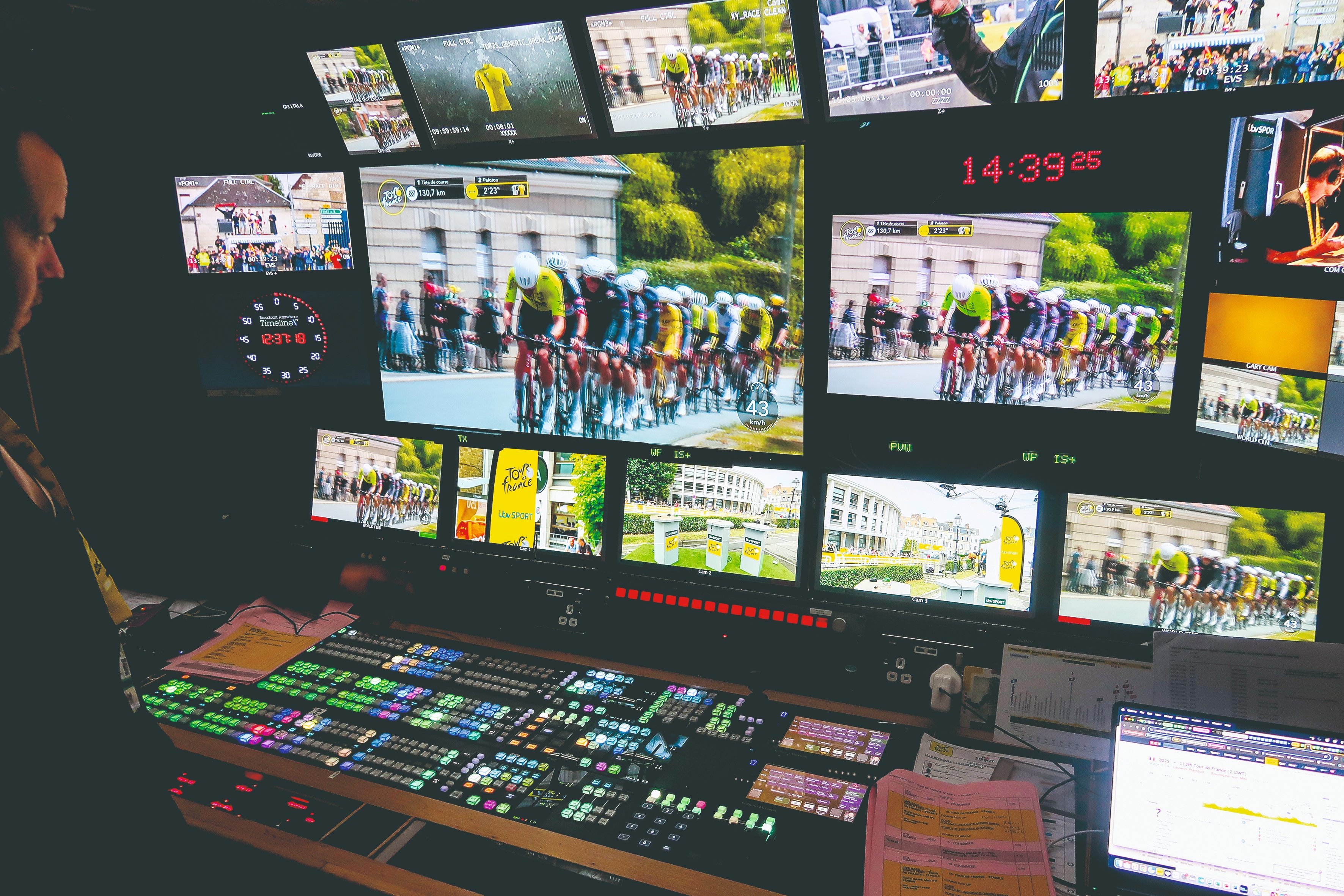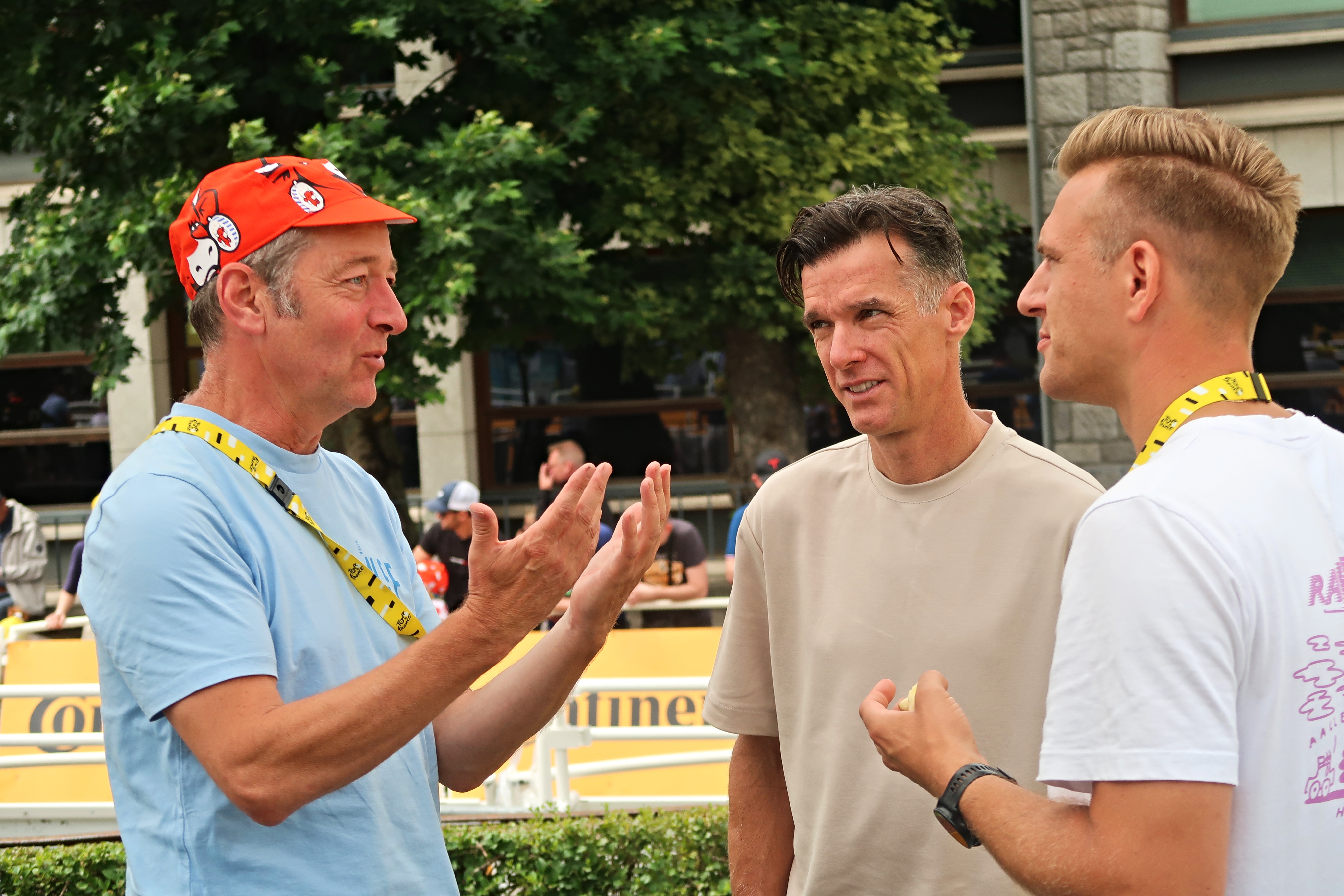Ned Boulting can’t keep in mind the final birthday he celebrated at house. For the previous twenty years, he has spent the day – 11 July – working for ITV on the Tour de France. On his first few birthdays away from house, the manufacturing crew would hurriedly expense him a bit of Tour merch as a present. “On the third or fourth event, I stated, ‘Should you ever give me one other mug, I’m going to smash it in entrance of you’,” Boulting now laughs. “In order that obtained nipped within the bud.” Lately, the date passes “routinely and roundly ignored” – however this 12 months, as his 56th birthday slips by, Boulting’s 23-year streak may lastly come to an finish.
Final autumn, it was introduced that ITV had dropped the rights to broadcast the Tour from 2026. The package deal was as a substitute offered solely to Warner Bros Discovery, the guardian firm of TNT Sports activities, in a deal that ended 40 years of free-to-air protection of the race within the UK. British followers had loved free Tour protection because it first aired on Channel 4 within the Eighties. The information triggered uproar, and left Boulting and his colleagues feeling each nostalgic and mournful as they set out on their last lap of France.
Come the night of 27 July, the ITV broadcast truck will pull out of the automotive park in Paris for the final time. I put it to Boulting that not less than he can look ahead to celebrating his birthday at house subsequent 12 months. “Completely not. No, no,” he snaps again. “That might be the very worst form of birthday I may think about.” Why’s that? “I simply wish to be on the Tour de France. It could really feel fully unnatural to not be on the Tour de France on my birthday.”
At stage two’s end in Boulogne-sur-Mer, ITV’s pop-up studio sits nestled within the zone method media village, overlooking the route, 250m from the end line. In three hours’ time, the riders will arrive, and Mathieu van der Poel will take the stage and the yellow jersey. Till then, there’s a campsite-like calmness among the many TV vans.
One of many crew members strolls round barefoot, his moist socks drying over a steel fence, sodden after spending two hours assembling the set within the rain. There’s an astroturf carpet on the ground, a gazebo overhead, and thick, black cables resulting in a big white truck. Inside, a kaleidoscope of screens play completely different scenes from the race. Boulting arrives contemporary from lunch in a Laughing Cow-branded cap, a freebie snatched from the Tour’s publicity caravan – and one he’s evidently connected to, selecting to maintain it on for Biking Weekly‘s photographs.

(Picture credit score: Tom Davidson)
The announcement of ITV’s rights loss to TNT Sports activities final October got here “out of the blue” for Boulting. Within the moments that adopted the information, he obtained a textual content from his co-commentator David Millar that learn: “I believed that it was a without end job”. In actuality, the writing had been on the wall.
“Our producers at all times share the viewing figures with us, and it was clear, from the peaks of 2014, there had been a really mild however regular and extended decline in free-to-air curiosity,” Boulting says. On stage one, greater than 600,000 viewers tuned in for the beginning of the race in Lille. The viewers, Boulting factors out, is “nonetheless very large – however on the similar time, I knew that the worth of renewing the rights was rising rather more shortly, on account of, I suppose, stress from subscription tv and ASO [the Tour’s organiser] simply upping the ante every time.”
The newest race content material, interviews, options, critiques and skilled shopping for guides, direct to your inbox!
Although he wasn’t concerned in discussions, Boulting may see his channel’s protection had reached a “tipping level”. “I gathered that for the final couple of years it had began to make a slight loss for ITV, so it was at all times weak to cost-cutting,” he says. When that second ultimately got here, followers felt it like a punch within the intestine: “tragic”, “an enormous disgrace”, “the tip of an period”, they wrote on social media. A petition was launched in a bid to make the Tour de France a ‘Class A occasion’ below the British broadcasting code, a transfer that might successfully implement free-to-air protection. The subject was even debated in Parliament – “as if there’s no more essential issues on the earth than this,” Boulting laughs – however the movement was swiftly dismissed.
From 2026, biking followers must pay £30.99 to look at the Tour dwell on TNT Sports activities. Even these prepared to pay to observe the race have been left annoyed – discovering that TNT’s Tour protection is interrupted by advert breaks. Informal viewers tuning in only for the race or chancing upon the protection whereas flicking by means of their free channels will quickly be a factor of the previous.

(Picture credit score: Tom Davidson)
Free-to-air timeline
1985 – Channel 4 begins every day highlights of the Tour de France
2000 – Tour highlights get pushed to later slots to make method for check match cricket
2001 – Channel 4 relinquishes Tour de France rights. ITV pays £5m to take over dwell protection
2003 – Ned Boulting makes Tour debut as an on-the-ground reporter, mistakenly calls the chief’s jersey ‘the yellow jumper’
2016 – Boulting replaces Phil Liggett as lead commentator, aided by David Millar
2024 – Warner Bros. Discovery publicizes exclusivity deal to point out the Tour within the UK, ending free-to-air broadcasts
2025 – ITV units out on farewell Tour
2027 – Tour set for UK Grand Départ (Edinburgh), doubtlessly with no free-to-air possibility
I’m reminded of David Millar’s 6ft 4in peak as he geese beneath the ITV gazebo. Again within the early Nineties, then a young person, he was one of many viewership’s budding followers. “It was the times if you solely had 4 TV channels. I’d simply come again from Hong Kong, the place I used to be brainwashed into mountainbiking, and I’d simply obtained into highway biking,” he remembers.
Watching the Tour on TV, the younger Scot discovered himself spellbound by Miguel Induráin, the highly effective time triallist who received 5 Excursions in a row. “I believed he was simply superb. He was so dignified,” says Millar. “I’d by no means seen a sport prefer it, and the Channel 4 present was so accessible.” Millar would go on to function on the present himself, first as a rider, successful the prologue time trial and first yellow jersey on debut in 2000, and later as a commentator, alongside Boulting.
Millar isn’t the one profitable British rider who was launched to professional highway racing by free-to-air TV protection. Picnic PostNL’s Oscar Onley was equally impressed. “I at all times used to look at the highlights on ITV after college each night, from 2010, till I left college,” says the 22-year-old. “My mum tells me that a variety of her mates ask the place they will watch me race. Clearly for the opposite races through the Tour, they’re on TNT, and you must pay for it, whereas the Tour you by no means needed to pay for.”
It’s a barrier of entry that may cease immediately’s college children from watching bike racing and pursuing careers in it. Come 2027, with the Tour’s Grand Départ on house turf in Scotland, it’s attainable – probably even – that Onley will line up with no free broadcast for native followers. “I hope there’s one thing sooner or later with free-to-view protection once more,” the Scot says. “I believe to get non-cycling individuals into biking, or simply to see what we do, that’s the way you’re going to do it.”

(Picture credit score: Tom Davidson)
Again in Boulogne-sur-Mer, the primary staff buses are arriving on the end line. Followers thump on the hoardings as they move in entrance of ITV’s studio, and trundle slowly beside the town’s stone ramparts. Wandering by means of the vans, retired sprinter Marcel Kittel pokes his head round a flailing banner, and is warmly pulled into dialog with Boulting and Millar. The pair break the information that their ITV days will quickly be over. However there’s a silver lining, they clarify: they’re engaged on a brand new mission, a dwell video podcast, that they plan to provide on the Tour subsequent 12 months. Suppose Check Match Particular, however filmed in a village alongside the race route.
If all goes properly, Boulting will spend his 57th birthday on the race he loves – and as many birthdays as attainable thereafter. The joy softens the blow of shedding the ITV gig, but it surely received’t make the ultimate day in Paris later this month any much less emotional. “Even in a standard 12 months, I discover that Monday morning after the Tour fully disorientating and tinged with melancholy,” he says.
It is going to take lower than an hour for the crew to dismantle the pop-up set. They’ll roll up the astroturf, pull down the gazebo, and bundle the cables collectively. Boulting, Millar, and the entire 30-strong forged of ITV’s manufacturing will then bid adieu to their travelling circus. “The sense of lack of an establishment is enduring in a method that has taken me abruptly,” Boulting says. For a lot of biking followers, subsequent summer time would be the first time of their lives the Tour has disappeared behind a paywall. Fan response has already proven that free-to-air protection might be sorely missed. Its loss can even show expensive, narrowing the game’s attain and dimming the spark of inspiration for the subsequent era of British riders.
Behind the theme track
ITV’s punchy accordion jingle has been the summer time soundtrack to UK residing rooms for over twenty years. The track is named ‘Beat Route’ – a meaningless play on phrases – and it was composed by Jeff Ashitey, a Surrey-based music producer. “We made it in south London in a studio that was in a flat,” Ashitey remembers. He was one in every of simply three individuals within the room, along with a sound engineer and a French accordionist. “As soon as we put the accordion down, it form of steered in a path. It grew organically by itself.”
Ashitey reduce collectively the total model and trimmed down shorter clips for the advert breaks – the latter would find yourself as a ringtone too, which rose to 3rd within the iTunes ringtone charts. Was he stunned by how properly the track was obtained? “It wasn’t till [my wife] Daybreak went to work for Biking Weekly that I realised it had turn out to be the Match of the Day for cyclists,” he says. “I’ve made just a few quid from it… They at all times used to snort at Daybreak within the workplace coming as much as the Tour, saying, ‘The place are you happening vacation this 12 months along with your cash?’”
With the lack of ITV’s Tour protection, the theme tune of summer time is about to vanish too. “I don’t need it to die. I don’t need it to only disappear,” says Ashitey. “It represents the Tour, and particularly for lots of British individuals who don’t essentially have TNT.” The accordion melody, he hopes, will dwell on, not less than in reminiscence.
This function initially appeared in Biking Weekly journal on 17 July. Subscribe now and by no means miss a problem.

